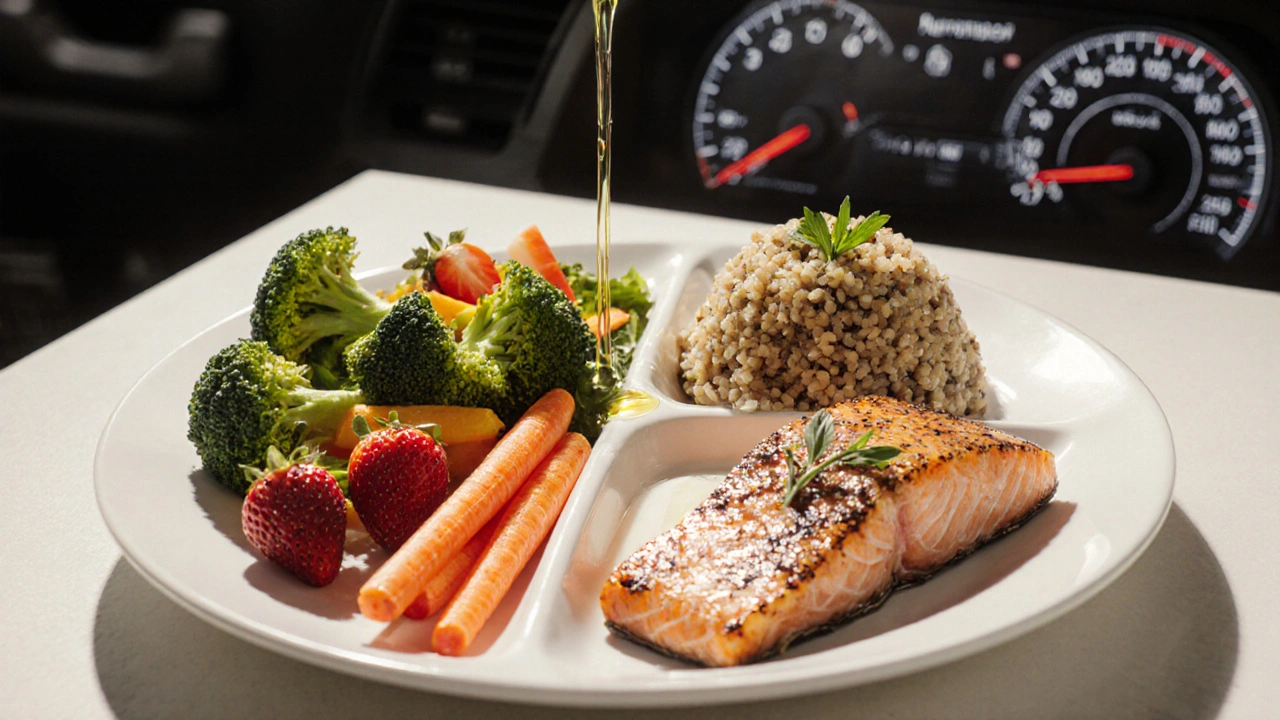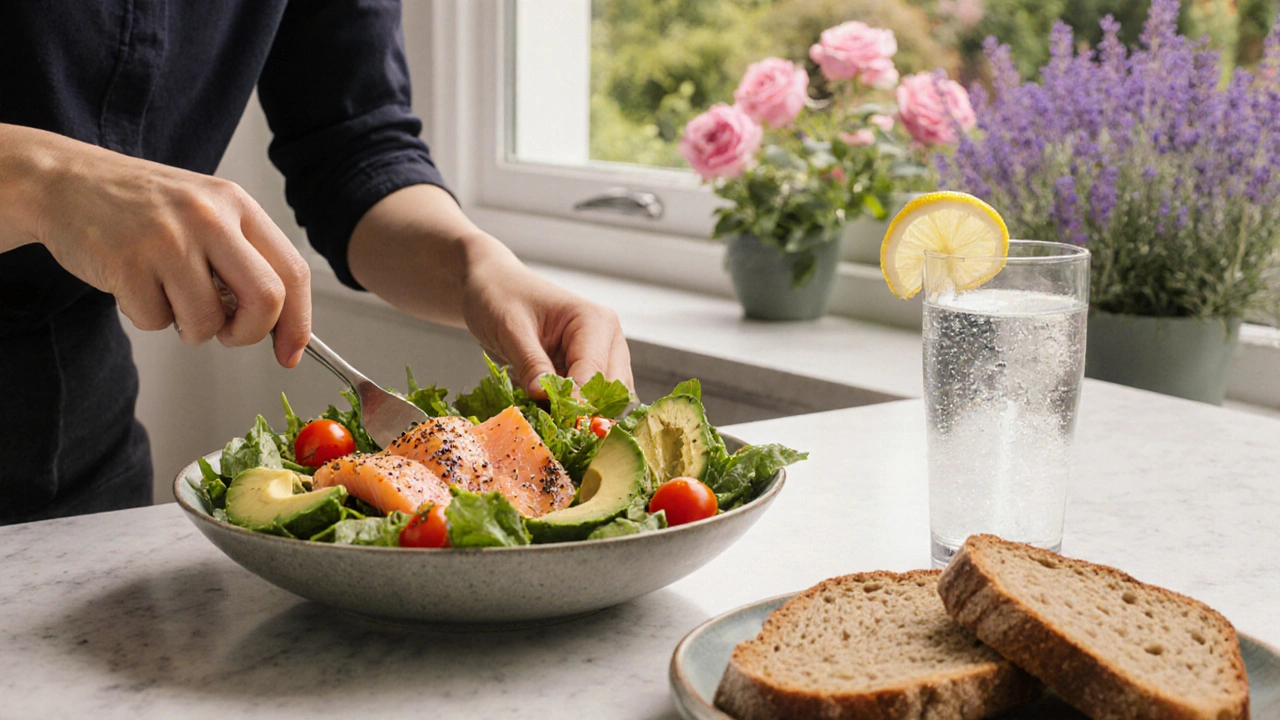Healthy diet: Simple, practical nutrition tips
Missing basic nutrition rules drains energy, clouds focus, and makes healthy habits hard to keep. A healthy diet isn't a strict plan. It's small, daily choices that add up. This tag page gathers practical ideas from recipes, snacks, and nutrients so you can feel better today and stay healthy long term.
First, aim for balance every meal. Pair protein with fiber and healthy fat to stabilize blood sugar and cut cravings. Examples: Greek yogurt with berries and a sprinkle of nuts, a canned tuna salad with mixed greens, or a bowl of oatmeal topped with peanut butter and banana. These combos keep energy steady and make meals satisfying.
Include whole foods more often. Swap refined carbs for whole grains. Choose whole fruit instead of juice. Add vegetables to breakfasts and snacks. Whole foods bring fiber, vitamins, and minerals that packaged foods usually lack. Over time, these swaps lower inflammation and improve digestion.
Don't ignore healthy fats. Omega-3 fats support heart and brain health. Fat from fatty fish, walnuts, and flaxseed helps mood and recovery after exercise. Use olive oil for cooking and dressings. Healthy fats also make meals more filling, which helps with weight control.
Watch portion sizes without obsessing. A simple rule: fill half your plate with vegetables, one quarter with protein, and one quarter with grains or starchy veg. That visual guide works at home and when eating out. If you want to lose weight, reduce the grain portion slightly and add more greens.
Hydration matters. Thirst can hide as hunger, especially midafternoon. Drink water regularly. Add a squeeze of lemon or a few cucumber slices to make it more appealing. Limit sugary drinks. If you crave flavor, try unsweetened herbal tea or sparkling water with a splash of juice.
Plan for smart snacks. Keep nuts, fresh fruit, hummus, and whole-grain crackers handy. These options keep blood sugar steady and help avoid fast-food choices. For heart-friendly snacks, try apple slices with almond butter or a small trail mix of walnuts, pumpkin seeds, and dried cranberries.
Use simple cooking tricks to save time. Batch-cook grains, roast a tray of mixed vegetables, and cook lean proteins in advance. These prep steps make healthy meals as quick as reaching for convenience food. Freeze portions so you always have a healthy option ready.
Be flexible and realistic. Perfection leads to burnout. If you eat more than planned, focus on the next meal instead of guilt. Small wins add up: swapping chips for carrots three times a week is progress.
If you take supplements, choose them to fill gaps, not replace food. For most people, a quality multivitamin and omega-3 can be helpful. Talk with a healthcare provider if you have specific concerns or health conditions.
Want recipes and research-backed tips? Browse the posts tagged here for breakfast ideas, snacks, and nutrient guides. Pick one change to try this week and build from there.
Small habit changes last when you plan, track, and reward progress—start with one simple swap this week right now.

Decoding the Healthy Diet: Answers to Your Top Nutrition Questions
A clear guide that explains what a healthy diet really means, breaks down nutrients, busts myths, and offers practical steps to build balanced meals.

Healthy Diet Essentials for a Vibrant Life
Discover how a healthy diet fuels energy, prevents disease, and supports a vibrant life with practical tips, food choices, and expert guidance.

Healthy Diet Secrets: How to Stick to Your Nutrition Goals
Unveil practical secrets for maintaining a healthy diet, managing weight, and making better food choices with tips that fit into real life, not just theory.

Discover the Power of a Healthy Diet
A healthy diet can transform your life in surprising ways. By focusing on nutrient-rich foods, balancing macronutrients, and staying hydrated, you can boost your energy levels and improve mental clarity. It's not just about eating less junk—it's about choosing the right foods that work for your body. With practical tips and a few small changes, you can invigorate your lifestyle and health.

Healthy Diet: Boost Your Immunity Naturally
Improving your immunity through a healthy diet is practical and achievable. By incorporating nutrient-rich foods, you can naturally strengthen your body's defenses. This article explores essential foods, debunks common myths, and offers practical tips to enhance your immune health. With these insights, maintaining a resilient immune system through diet becomes straightforward.

Optimizing Gastrointestinal Health: A Comprehensive Guide
In the pursuit of a healthy lifestyle, gastrointestinal health plays a pivotal role. This article explores practical strategies and easy-to-understand insights for maintaining a happy gut. It delves into the importance of diet, beneficial bacteria, and regular health checks to ensure a resilient digestive system. Concepts such as dietary choices, lifestyle adjustments and the significance of gut-brain connection are also discussed. By integrating these tips, readers can enhance their digestive health naturally and effectively.

The Link Between Health Anxiety and Mental Health
Nov, 28 2023



